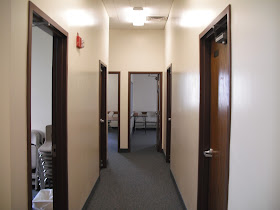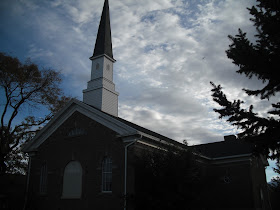Built in the late 1940s, the Newton Ward chapel was a curious structure made of yellow brick, but still beautiful in its own right.
 |
| (Image Source: Church History Library) |
One local member, Everett Thorpe, painted a beautiful mural titled "Suffer the Children." It is 6 feet high and 8 feet wide. It was hung at the front of the chapel.
The members had to fight to save this painting--twice. When the building was remodeled in the 1970s, the Church's building committee planned to remove it from the chapel, as the policy no longer allowed paintings in the chapel. The members absolutely refused, and it stayed where it was.
There is a Youtube video of a member walking through the building
here. At around 9:00, you can see the picture in the chapel.
In 2002, the building was replaced with a standard one. This time, the members were told that there was no place to hang the painting in the building (which seems highly unlikely to me); however, after some discussion, it was hung in the north lobby, where it continues to be admired by the local members.
Thanks goodness the local members cared enough about this painting to do something about it. Now, it can be enjoyed for years to come.














































